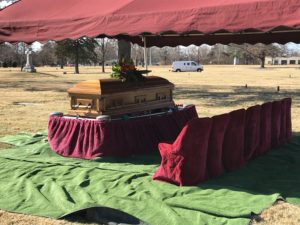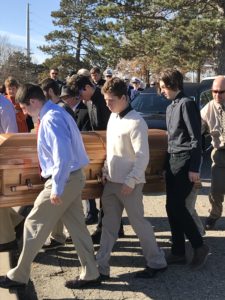
Death and kids don’t always go well together, but it is something that happens, no matter how much we’d like to shield our kids from it. It is important to allow them the opportunity to grieve as much as you need that yourself. Grieving is a healthy thing. In ancient times they would stop everything for weeks to grieve, and so let’s not expect that, in our modern sensibilities, we need any less… in some cases, we need more.
Last week, the six of us made an eight-hour drive to Topeka, Kansas, for my Mother-in-Law’s Funeral. There had been an accident which caused the death of my kid’s “Granny” almost a week prior, and we dropped everything and made the journey.
Granny had lived the last decade or so of her life in Kansas, while we live in Colorado. The kids had gotten used to the concept of only seeing her every-so-often, but even still they had a great connection to her and felt the impact of her passing.
One of my daughters expressed, “…but she was the “Fun” one!”
Of course the tears came …which is healthy and right, but there was a strength that I saw in my family that was remarkable. We kept the lines of communication as far open as possible, and spoke openly about the realities of life. Everyone of my four children took it differently, because they all had their own experiences with her. I made sure I was available for all of them.

(my boys are in black)
Death is where the rubber meets the road as far as your faith is concerned. We are Bible-believing Christians who live out – to the best of our ability – what we believe. I am convinced that this is where the strength comes from. I watched as I informed my 11 year-old daughter that “Granny” was going to die, and I saw – through tears streaming down her face – the truth shine through in the words that expressed her heart.
“God is taking care of it,” she said.
She knows, that because of what Jesus Christ did for all mankind, death is not the end. She has personally accepted that truth. We will miss Granny, but as I was reminded, multiple times throughout the week, that the entire Bible has been written, as was the letter the Apostle Paul wrote to the Thessalonians, to teach us that there is hope:
“But we do not want you to be uninformed, brothers, about those who are asleep, that you may not grieve as others do who have no hope. For since we believe that Jesus died and rose again, even so, through Jesus, God will bring with him those who have fallen asleep. For this we declare to you by a word from the Lord, that we who are alive, who are left until the coming of the Lord, will not precede those who have fallen asleep. For the Lord himself will descend from heaven with a cry of command, with the voice of an archangel, and with the sound of the trumpet of God. And the dead in Christ will rise first.”
— 1 Thessalonians 4:13-16
This hope held our family up during this time of loss. I could see it in my wife who spoke and sung at the ceremony (yes sung – through tears – because her mother always loved to hear her sing). I saw it in my girls faces as they carried out the formal traditions we have come to perform at a funeral. I saw it in the somber faces of my boys as they carried the casket, and yet spoke freely about the truth of life and death that same day. We grieved, but not without hope, and the conversations during that “formal time” of the wake, and the journey to the cemetery allowed me to guide the understanding my children have about death to a healthy place.
And so, while all six of us dropped everything to make a special trip out to Topeka, we did not do it grieving as those “who have no hope.” We did it grieving the loss, but celebrating the life that she lived, and that we get to live through her genes in my kids, knowing that she is no longer in pain and that we will see her again.

